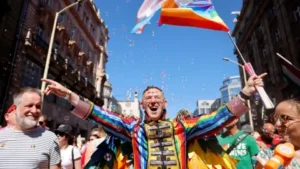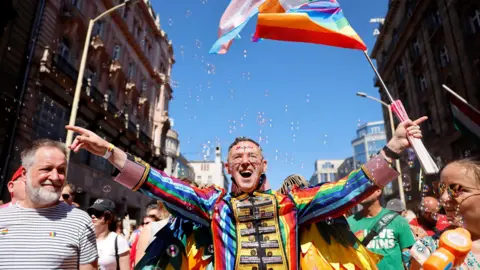On June 28, 2025, Hungary witnessed a remarkable display of resilience and defiance as tens of thousands gathered in Budapest for the Pride march, a significant event overshadowed by the legal threats issued by Hungarian Prime Minister Viktor Orban. This annual celebration, which promotes LGBTQ+ rights and visibility, faced unprecedented pressure from national conservative politicians and law enforcement agencies determined to suppress expressions of support for the community.
The march’s organizers anticipated record attendance, with participants undeterred by a new law designed to restrict gatherings deemed as promoting homosexuality. Dubbed a “child protection” initiative by the government, this legislation has stirred fierce debate among activists and allies. One participant, a mother, articulated her motivations for attending: the belief that her children deserve to live in a country embraced by diversity rather than discrimination and oppression.
Regardless of the vibrant spirit that marked the event, Orban’s warnings of potential violence and legal consequences for attendees loomed large. He acknowledged the police’s authority to disperse gatherings but insisted on the civil nature of Hungarian society, asserting that violence is not an option in such situations. He cautioned attendees about the possible repercussions they would face, including fines of up to €500 (approximately $586) and penalties for organizers that could lead to one-year prison sentences.
The march brought together individuals from diverse backgrounds, united in their quest for a more inclusive society. One attendee, a 34-year-old named Luca, expressed her concerns about the future of her daughter, fearing that the laws could hinder her ability to express her love freely. “We are here to resist a law that prevents individuals who differ from others from gathering,” she noted, acknowledging the emotional weight of their right to assemble peacefully.
This gathering also attracted European dignitaries, with EU equalities commissioner Hadja Lahbib planning to join the march. Her presence underscores the broader international support for LGBTQ rights amid rising nationalist sentiments in various European nations. Lahbib posted a message on social media, signifying her solidarity with the movement and standing alongside liberal Budapest mayor Gergely Karacsony, who also condemned the government’s dismissal of LGBTQ rights.
Furthermore, dozens of Members of the European Parliament (MEPs) were present, signaling an awakening among European lawmakers regarding the importance of standing with persecuted communities. Finnish MEP Li Andersson articulated this sentiment by emphasizing that the march transcends mere celebration; it symbolizes the fundamental rights owed to all individuals. She accused the Orban government of leveraging family values as a façade to justify the suppression of such vital expressions of identity and humanity.
As the Pride march unfolded, participants expressed their support for the LGBTQ community, countering fears and prejudices prevalent in some segments of Hungarian society. Barnabás, a young attendee, shared his motivation to stand in solidarity, recalling experiences of feeling marginalized. His narrative illustrated a growing acknowledgment that the fight for equality is a collective mission extending beyond individual identities.
Karacsony assured participants that they would not face reprisals for attending the event, affirming that the march was a municipal affair, co-organized by city hall. This affirmation stands in stark contrast to the central government’s attempts to assert control over public expressions of dissent.
As the event unfolded against a backdrop of political uncertainty and social division, it cast a spotlight on Hungary’s evolving attitudes toward LGBTQ rights and the persistent struggle against prejudice. The march epitomized not only a celebration of love and diversity, but a clarion call for civil liberties and human rights within a European context increasingly entangled in debates over nationalism and inclusion. Thus, the Budapest Pride march became a mainstay of resilience in the face of adversity, embodying the ongoing fight for dignity and equity for the LGBTQ community not just in Hungary, but across the globe.











